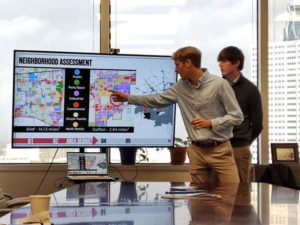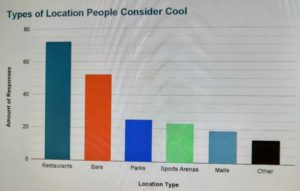The West Houston Association started working with Rice University’s Social Science Consulting Practicum in August of 2020. Since this time, WHA has engaged over a two-dozen Rice University students across eight real-world projects. Students in the program interact with WHA members and community partners seeking creative solutions to challenges facing the greater West Houston region. These experiential learning opportunities have students engaged in research and analysis culminating in a presentation and report on their recommendations. Our two most recent collaborations wrapped up this month.
 The first project, presented to WHA members on December 6th, explored the topic of neighborhood revitalization. The students conducted case studies on developments that have undergone urban revitalization in Baton Rouge, LA, Birmingham, AL, and Columbus, OH, coupled with conversations with representatives from the Alief and Gulfton communities in Houston, TX to gain insight on the needs of the area and their residents. From this work they compiled the recommendation encourage development of a grocery-oriented community hub on a plot of land just south of the Burnett Bayland Park, capitalizing off of the existing community garden. The development could include a multi-purpose pavilion to host farmers markets and community events, learning kitchens for cooking courses and highlight local cuisines, and mini soccer fields given Houston being chosen as a World Cup host city.
The first project, presented to WHA members on December 6th, explored the topic of neighborhood revitalization. The students conducted case studies on developments that have undergone urban revitalization in Baton Rouge, LA, Birmingham, AL, and Columbus, OH, coupled with conversations with representatives from the Alief and Gulfton communities in Houston, TX to gain insight on the needs of the area and their residents. From this work they compiled the recommendation encourage development of a grocery-oriented community hub on a plot of land just south of the Burnett Bayland Park, capitalizing off of the existing community garden. The development could include a multi-purpose pavilion to host farmers markets and community events, learning kitchens for cooking courses and highlight local cuisines, and mini soccer fields given Houston being chosen as a World Cup host city.

The second project continues our series that explores what makes an area “cool” or attractive regarding entertainment, cultural, and social factors. This project was the first to utilize an in-person intercept survey, generating over 200 responses. The team set out to quantify the actual meaning of the word “cool” starting with a survey at popular hub spots: Katy Mills Mall, City Centre, Galleria, Memorial Park, and Herman Park, asking respondents to identify their favorite “cool” spot, explaining why they chose it, and where they would recommend a tourist to visit. They found that most people think of restaurants or bars as locations they consider cool, there was a leaning towards naming places in Montrose, Heights, Washington Ave, Midtown, and Rice Village, and that cool is best defined as “a trendy, worthwhile place that intrigues the consumer to spend time there.”
Grant Levesque, one of the Rice students on the team, described the experience saying, “Our team learned about different demographic response tendencies and how different areas of Houston attract diverse people.” Ernesto Alfaro (LJA Engineering) who worked with one of the teams believe that “the most important aspect about working with students in this manner is the engagement with real-world scenarios, in and of itself. Understanding how to approach a given problem is very different outside the metaphorical boundaries of the university. The sooner students begin to understand this, the better prepared they will be for life and work after college. The more we as professionals can bring students into that reality, the better it will be for them, and ultimately, for the companies or entities of which the students will one day be a part.”
Gloria Pereira Diaz, the faculty member who oversees the program, values the collaboration with WHA “because it provides a great opportunity for students to develop consulting, data analysis, presentation skills in the context of real-world issues. They can apply the concepts they learn in class to help the economic development of West Houston. Students tell me how they appreciate the opportunity to explore areas of Greater Houston that they might not be familiar with and to contribute their part to make a positive change.”
Past projects have included collaborations with the City of Jersey Village exploring the potential of a minor league sports team expansion which is an ongoing conversation, exploring what the City of Hempstead can do to create a greater sense of place with currently under utilized land, and building off of assets in the Katy region to increase cultural appeal. A complete list of projects, students, and reports are available on the WHA website as part of our Quality of Life research series.
WHA looks forward to continued collaboration with Rice University School of Social Science on this program and is planning for at least two more projects in 2023.
